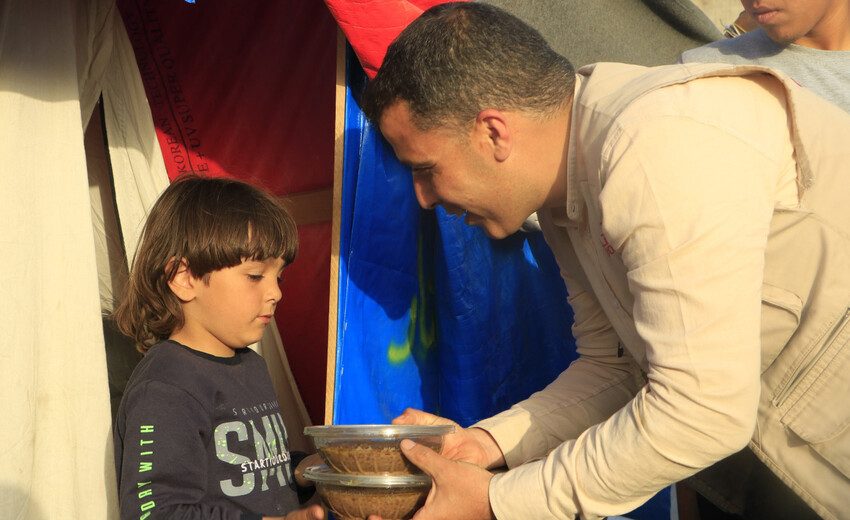The impact of conflict to the starvation of children: an appeal for EU Action
28 May 2024On World Hunger Day, the Plan International EU Office calls on the EU to critically address the needs of millions of children whose futures are being denied by malnutrition and starvation.

Young child in Gaza receives hot meal from Plan partner Taawon. Copyright: Taawon Welfare Association, 2024.
This year, armed conflicts and military aggression have been the primary causes of hunger crises.
The devastating crises in Gaza and Sudan
In Gaza, Israel’s relentless military offensive following the October 7 attack by Palestinian armed groups has led to the most severe food crisis ever recorded by ICP. Famine is imminent, if not already occurring in the North as stated recently by the head of the World Food Programme (WFP). Civilians in Gaza have become dependent on humanitarian aid for survival while the Israeli military offensive severely restricts humanitarian organisations from delivering essential food, health, water, sanitation and other critical aid to the besieged population. The continuing bombardments and the consistent obstructions of humanitarian access, as well as security challenges faced by aid workers, are worsening the already dire situation.
The international community must take urgent action to address these humanitarian challenges and push to end violations of International Humanitarian Law (IHL). It is important that the EU continues to push for guaranteed and unfettered humanitarian access and promote conditions of peace in conflict-affected areas, as well as an immediate and sustained ceasefire. We also continue to demand with our fellow humanitarian organisations, human rights peers, governments and people around the world for all Member States to immediately cease all arms transfers while there is a risk they are used to commit violations of IHL. The violence and suffering inflicted on Palestinian civilians must be brought to an end.
In Sudan, the conflict between the Sudanese Armed Forces (SAF) and the Rapid Support Forces (RSF) that began in April 2023 has resulted in more than a third of the population falling into acute food insecurity. Agriculture and food production have been severely disrupted. Access to land for farming, livestock movement, and seasonal activities has been restricted, making it incredibly difficult for families to produce food. Access denied also means assistance denied. Critical infrastructures, particularly in the south-eastern regions – the country’s breadbasket – have been destroyed. This catastrophic situation needs immediate international intervention to prevent further deterioration. The EU must continue pushing to increase accountability, justice and political costs for those who use starvation as a weapon of war.
Children severely affected
Children in Gaza, Sudan and other areas of the world, are the prime casualties of these devastating realities. Starvation is perhaps one of the most painful way for a child to die, as Plan International Global Humanitarian Director Dr Unni Krishnan has argued. The human body can only survive for a few weeks without enough sustenance. A child with deficiency in vital nutrients such as iron and calcium, proteins, and amino acids will find it difficult to breathe, walk, or even talk. Their defence mechanisms deteriorate until their systems eventually come to a complete stop.
These are human-made hunger crises and war induced famine. The Plan International EU Office also warns that sustained food insecurity often forces families to resort to harmful coping mechanisms like child labour and early marriage. As a result, it is important for the international community to prioritise funding for gender-responsive child protection food and nutrition programmes, such as critical school feeding initiatives, and alternative food distribution measures in the event of school closures, like school meal collection services or cash transfers. It is important that these programmes are safe, accessible, and accountable to children. Yet, Plan International has observed a pattern where, in situations of food insecurity with limited funding, the first aspects to be eliminated from related programmes are those focused on child protection and gender responsiveness. It is important for the EU to adequately prioritise these and support key food security actors, such as the World Food Programme and humanitarian organisations like Plan International and our peers who work in and with communities daily.
On World Hunger Day, it is imperative to remember that fighting against hunger means more than just providing food. It is about promoting peace, increasing accountability and justice. It is about safeguarding children and girls’ specific needs, to prevent the loss of millions of lives.
Blog post: Beyond bullets: Sudan’s stolen childhoods. Read here.
Categories: Early childhood development, Emergencies, Protection from violence



